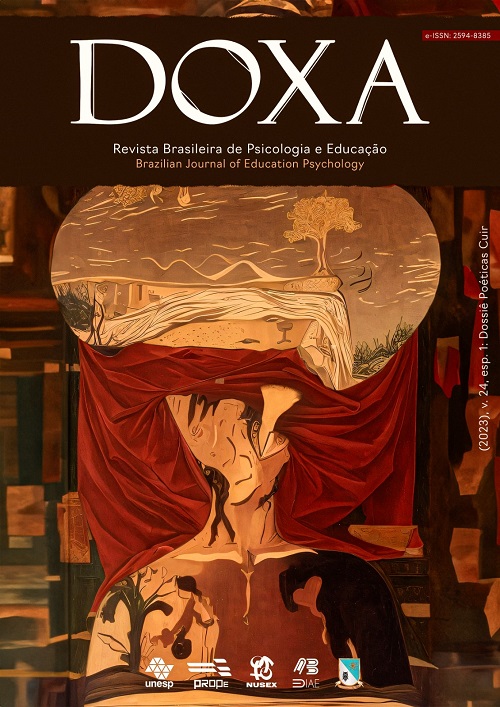Poetical letters
Potentialities of trans authority writing
DOI:
https://doi.org/10.30715/doxa.v24iesp.1.18183Keywords:
Letter, Literature, Memory, TransmasculinitiesAbstract
The literary field has been demarcated by writings available to (de)construct narratives through other lenses, repositioning experiences considered subaltern. Understood not only as an artistic expression, but also as a language permeated by ideological values and discourses, writing creates fiction and produces memory. Based on this principle, the present work aims to analyze literary narratives from the exchange of correspondence between the authors of this research and transmasculine poets. With reference to the studies produced by Anzaldúa (1980) and Mombaça (2021), we will discuss the potential present in the literary encounter between letters and poetry, presenting other forms of writing production, thus confronting one of the pillars of literary canons: cisnormativity, in addition to strengthened the policy of alliances and agencies around experiences and knowledge linked to transmasculinities.
Downloads
References
ANZALDÚA, G. Falando em línguas: uma carta para as mulheres escritoras do terceiro mundo. Revistas Estudos Feministas, v. 8, n. 1, p. 229-236, 1980. Disponível em: https://periodicos.ufsc.br/index.php/ref/article/view/9880. Acesso em: 05 maio 2022.
ANZALDÚA. G. Queer(izar) a escritora – Loca, escritora y chicana. In: KEATING, A. L. (ed.). The Gloria Anzaldúa Reader. Tradução: Tatiana Nascimento. Durham: Duke University Press, 2009. p. 163-175.
BATTISTELLI, B. M. Cartas-grafias: entre cuidado, pesquisa e acolhimento. 2017. Dissertação (Mestrado em Psicologia Social e Institucional) – Universidade Federal do Rio Grande do Sul, 2017.
HALL, S. A identidade cultural na pós-modernidade. Rio de Janeiro: DP & A, 2011.
HERZER, A. A Queda para o Alto. Petrópolis, RJ: Editora Vozes, 1982.
JADE, C. Ode (o) à masculinidade. Revista Transviades, v. 1, n. 1, p. 38, 2020. Disponível em: https://revistaestudostransviades.wordpress.com/. Acesso em: 3 ago. 2022. Disponível em: https://revistaestudostransviades.files.wordpress.com/2020/07/revista-estudos-transviades-v.-1-n.-1-jul.-2020.pdf. Acesso em: 10 jun. 2022.
KILOMBA, G. Memórias da Plantação. Episódios de Racismo Cotidiano. Rio de Janeiro: Cobogó, 2019.
MOMBAÇA, J. Não vão nos matar agora. Rio de Janeiro: Cobogó, 2021.
PRECIADO, P. Dizemos Revolução. In: HOLLANDA, H. B. (org.). Pensamento feminista hoje: sexualidades no sul global. Rio de Janeiro: Bazar do Tempo, 2020.
RODRIGUES, E. Com mãos atadas e como quem pisa em ovos. Salvador: Boto-cor-de-rosa livros, 2021.
RODRIGUES, E. Sal a gosto. Brasília, DF: Padê editorial, 2018.
SANTANA, B. S.; PEÇANHA, L. M. B.; GONÇALVES, V. G. Transmasculinidades negras: narrativas plurais em primeira pessoa. São Paulo: Ciclo Contínuo Editorial, 2021.
Published
How to Cite
Issue
Section
License
Copyright (c) 2023 DOXA: Revista Brasileira de Psicologia e Educação

This work is licensed under a Creative Commons Attribution-NonCommercial-ShareAlike 4.0 International License.
Manuscritos aceitos e publicados são de propriedade da Doxa. É vedada a submissão integral ou parcial do manuscrito a qualquer outro periódico. A responsabilidade do conteúdo dos artigos é exclusiva dos autores. É vedada a tradução para outro idioma sem a autorização escrita do Editor ouvida a Comissão Editorial.










